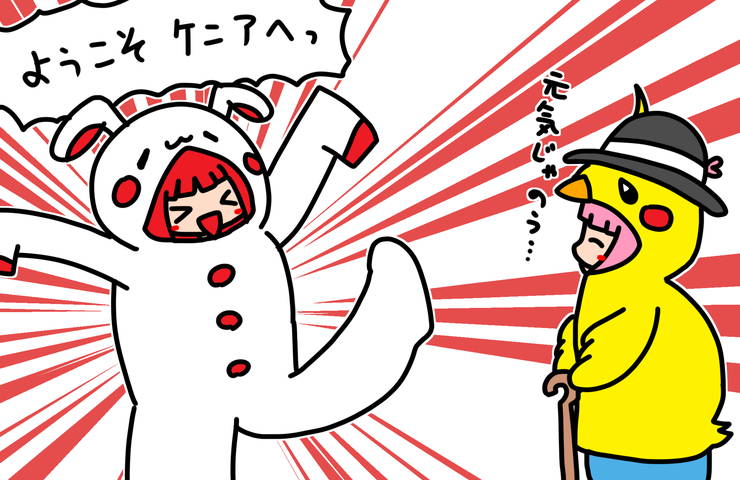
“Watu wote” : “All people” (wote means “all, every”, but is the form of the word “-ote” specifically for Noun classes 2 and 11 in this case, the Noun watu means “people” and belongs to class 2) “Kenya yetu” : “Our Kenya” ( yetu means “our”, but is the form of the word “-etu” specifically for Noun classes 4, 6, 9) Here are examples of Nouns with Adjectives in this song: Essentially the noun classes function to create Harmony and Sense in the language, as the class of the noun determines prefixing for the noun and its adjectives and other qualifiers. In the Vocabulary and Etymology section, I have listed the main nouns in this song, along with their appropriate noun class.

*as you can see with “tunda” (singular “fruit”), there are exceptions in the KI/VI (7/8) Animals, objects kiti/viti (“chair/chairs”) JI/MA (5/6) Fruits, objects tunda*/matunda (“fruit/fruits”) M/MI (3/4) Nature,activity mti/miti (“tree/trees”) M/WA (1/2) Humans mtu/watu (“person/people”) Here is short simplifcation of the first 10 classes, which are the most logical and regular to begin with:

Depending on the Class (which is based traditionally on Semantics or meaning), a noun and its adjectives will take a certain prefix which identifiies the class and whether it is singular or plural. There are 13 so-called Nominal classes, and 3 Locative classes, each usually given a number from 1 to 16 for organization purposes. Swahili has a rather complex system of Noun Classes.

“Good afternoon” (“News of the afternoon) “Good morning” (Literally, “news of the morning”) However there are daily greetings which also used “Habari”: The “Habari” greeting, “Habari gani?” (“What kind of news?” or more typically “How are things?”) is usually answered with “Nzuri” (“good”) or “Nzuri sana” (“Very good”). (“Not much.” literally, “(I have) no matters.”) Hujambo? (“What’s up?” literally, “(you have) no matters?”)ī. There are other forms of the “Jambo” greeting. Habari gani? (“How are you?” literally “What kind of news?”) This song contains in the chorus a very simple, common exchange in Swahili, with the very rough equivalents in English and their literal translations:ī. Mtu – (noun, 1/2) person, someone plural form is watu “people, population” Karibu – (phrase) “welcome”, “come in”, like いらっしゃいませ (irasshaimase) in Japanese also related to the adverb for “nearby” or “soon”ġ0. Geni – (adjective) strange, unusual, foreign noun forms (1/2) are singular mgeni, plural wageniĦ. Matata – (plural noun, 6) problems from verb tata, “to tangle”ĥ. Habari – (noun, 9/10) news, information from Arabic خبر (“habar, khabar”) meaning “news, information”, as in مرحبا (“marhaba”, or “welcome”), which is related to greetings in Kiswahili “Habari gani” (“what kind of news?”) and Bahasa Melayu “Apa Khabar” (“what news?”)Ĥ. Bwana – (noun, 5/6) mister, sir, man, waiterģ. Jambo – (noun, 5/6) matter, affair, thiing, businessĢ. There are no problems, there are no problemsġ. Kenya, good country, there are no problemsĬountry with peace, there are no problems Hakuna matata, hakuna matata ( There are no problems, there are no problems)Īre you interested in climbing Kilimanjaro? See our Dates & Prices.“Greetings, Sir” (Translation by ORS, 2010) Wakaribishwa, hakuna matata ( All are welcome, there are no problems)

Watu wote, hakuna matata (Everybody, there are no problems ) Nchi yenye amani, hakuna matata ( Country of peace, there are no problems) Nchi ya maajabu, hakuna matata (Country of wonder, there are no problems ) Kenya nchi nzuri, hakuna matata (Kenya is a nice country, there are no problems ) Kenya yetu, hakuna matata (Our Kenya has no problems) Wageni, mwakaribishwa (Foreigners, you’re welcome) Them Mushroom’s original lyrics are translated below: Harrison wrote the song using the same simple phrases to teach Swahili to foreigners. There were two tourists trying to speak Swahili and practicing basic conversational phrases. The song’s creation stemmed from a conversation that the band leader, Teddy Harrison, overheard while performing in a hotel in Mombasa.


 0 kommentar(er)
0 kommentar(er)
